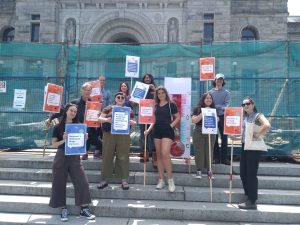
How did you become involved with the Worker Solidarity Network?
I’ve been part of the organization for five years. Initially, it was called “Retail Action Network”, and they used to conduct outreach at my workplace. Given my deep-seated passion for social justice, labour justice, and gender justice, I started as a volunteer. As the organization expanded, they began hiring individuals to enhance their reach, and I applied for a position. The name transitioned to its current form three years ago in 2021, broadening its focus beyond retail. Through our legal advocacy program, we’ve been able to extend assistance to workers facing human rights issues, health concerns, and safety matters throughout British Columbia.
Why is precarity significant for the organization now and in the future?
The organization focuses on supporting non-unionized workers through the legal advocacy program, and many of these workers find themselves in precarious employment situations. These jobs lack protection, exposing workers to mistreatment and limiting their bargaining power for better standards. Within our legal advocacy program, workers in precarious situations often encounter injustices, such as unjust termination or discrimination. While their rights and protections contribute to their vulnerability in precarious work, the absence of employment protections exacerbates their precarity. A pervasive fear of the cost of living crisis prevents them from challenging mistreatment, as they feel unable to risk their employment. Through our legal advocacy program, we empower workers to confront injustices in the workplace, specifically within precarious work situations. Often, workers feel tethered to undesirable jobs, expressing sentiments like “I’ll just deal with it” due to the belief that they’ll end up in another bad job anyway, coupled with the fear of job loss. Despite this, we recognize, through the key pillars of our work, that it’s not the lack of power or voices on the part of workers, but rather systemic barriers that hinder them. By redistributing power, we put solidarity into action, demanding an equitable future for all. Many of these workers deserve better protections, with the majority not earning a living wage.

Is there a specific project that excites you, and why?
One project that particularly excites me is the intersection between precarious employment and climate, titled the “Can’t Stand the Heat, Get Out of the Kitchen Report.” This report delves into the impact of extreme weather events on precarious workers. What we discovered was that during such events, job precarity intensifies, with workers enduring challenging conditions such as working during heat waves or in flooded areas during the 2021 floods. The report also sheds light on business closures in extreme weather, leading to job loss or workers refusing to work during these events. At the crossroads of climate and labor, workers are asserting their rights in the workplace, and this impact extends beyond the professional sphere. For instance, workers facing improper working conditions are likely residing in homes without air conditioning, highlighting the broader implications of inadequate compensation for maintaining safe working conditions at home.
What has your experience at this organization taught you?
Having been a community organizer for a substantial period, I’ve come to realize that there are far more workers than individuals in positions of power. In this role, I’ve learned, both from my community allies and the experiences of fellow workers within our organization, that when we collectively confront and challenge an unjust employer or government, exerting political pressure for improved worker protection, we emerge victorious. The collective fight is where we find our strength and victories.
